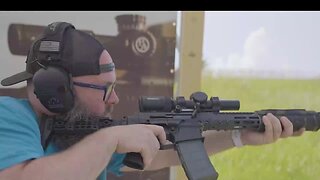Premium Only Content

ADMIRAL USHAKOV (1953). In Russian with English subtitles
ADMIRAL USHAKOV is the first part of two part series of Russian films produced in the Soviet era dealing with thee career of Admiral Fyodor Ushakov. It covers the era of the Russo-Turkish War, 1787-1732, directed by Mikhail Romm and starring Ivan Pereverzev, Boris Livanov and Sergei Bondarchuk.
The film portrays the career of Fyodor Ushakov, regarded as one of the greatest naval commanders in history. As admiral of the Russian fleet under Catherine the Great and Paul I, he won every battle he participated in. A sequel, ATTACK FROM TH SEA, was released the same year. The film is dedicated to the formation of the Russian fleet on the Black Sea.
PLOT:
In 1780, Captain of the Imperial Navy Fyodor Ushakov asks the Commander-in-Chief Grigory Potemkin to oversee the construction of the Black Sea Fleet. This means giving up a career at the royal court in St. Petersburg. Three years later, Ushakov arrives at the Kherson shipyards with a contingent of sailors and craftsmen. An epidemic of plague rages among the workers. Tikhon Prokofiev, nicknamed the Ragged Ear, encourages the workers to flee the city and set fire to the shipyards, at the instigation of the English spy Orfano. With the help of his sailors, Ushakov stops the rebels and organizes a fire-fighting brigade to put out the fire. A strict quarantine regime is introduced and the plague is brought under control. Viktor Ermolaev, a mere boy, asks Ushakov to enlist in the Russian Navy. Ushakov refuses him, because the ships are not yet finished.
While shipbuilders work on constructing the fleet, Ushakov conducts artillery training for the officers. Throughout the film, he stresses the importance of accuracy in artillery firing. Potemkin arrives to witness the launching of the ships. The head of the newly created Black Sea Admiralty board, Count Mordovtsev, informs Potemkin that Ushakov has not been training his officers strictly according to naval statutes. Potemkin sees the potential of a talented naval commander, and dismisses his transgressions. Workmen cut the ropes holding the St. Paul on drydock, and the battleship is launched into the sea. The boy, Viktor Ermolaev, despite protests from his mother, runs to the ship to join the Navy.
Fast forward to 1787. At the head of an entourage of courtiers and foreign ambassadors, Catherine the Great travels to Crimea to inspect the fleet. Potemkin complains to the ambassadors that Turkish pirates operating in the Black Sea are using English and French weapons. The ambassadors of Great Britain and France ignore the statements. Potemkin decides to surprise the audience with a display of military might. At his signal, Ushakov commands the battleships to fire on an abandoned fortress. Ushakov, in his excitement at the accurate firing of the gunners, cries out "Well done Vasiliev, a glass of vodka for everyone!". Despite his indelicacy, the Empress promotes Count Voinovich to Rear Admiral, and Ushakov to Brigadier General.
The British government wishes to maintain its supremacy of the seas and is concerned about the appearance of the Russian fleet on the Black Sea. Prime Minister William Pitt the Younger decides the best way to contain the Russian fleet is by goading the Turkish sultan into war against Russia. The sultan takes the bait, orders the Russian ambassador to be imprisoned in the Fortress of the Seven Towers, and declares war on Russia. In Crimea, a liaison officer informs the English spy Orfano that war is beginning. The British are arranging that the Crimean Tatars rise up in revolt when the Turks land in Crimea. Orfano's task is to get rid of Ushakov, and he enlists Tikhon Prokofiev to kill him. Instead of agreeing to the order, Prokofiev attacks Orfano, but is forced to stop when a group of sailors passes by. Orfano informs Count Mordovtsev that Ushakov is harboring a runaway convict. When Mordovtsev goes to report this to Potemkin, Senyavin arrives with the news that Turkey has declared war on Russia.
In the second year of the Russo-Turkish War (1787-1792), the Battle of Fidonisi takes place near Snake Island (Black Sea). Fidonisi is the Greek name for the island. The Turks have a clear advantage of 17 battleships against 2 Russian, but Brigadier General Ushakov, commanding the battleship St. Paul and the frigates Berislav and Strela, is confident he can achieve victory. He convinces Rear Admiral Count Voinovich to let him act at his own discretion. Before the battle, Prokofiev confesses to Ushakov that he is a runaway convict, but Ushakov orders him to take his post. Ushakov's three ships break away from the squadron and maneuver to the head of the Turkish line. The Turks open fire, but their shots fall short. Ushakov forbids shooting back until the ships are within firing distance. The Turkish commander orders his sailors to prepare for boarding, but the Russian ships open a devastating round of fire on the Turkish line. The Turkish flagship is under fire from both sides, causing the Turkish line to turn away and flee. The Russians are victorious.
In 1790, the Battle of Tendra results in another Russian victory. In London, officers Edward Foote and Horatio Nelson analyze Ushakov's tactics in the battle. Foote sees his violation of the rules of engagement as barbarous, but Nelson admires his innovations. Nelson's superior officer reminds him of the fate of Admiral Bing, who was shot for violating the regulations of the Admiralty. In Constantinople, the Turkish Sultan and his associates discuss the situation. Admiral Said-Ali, an Algerian, reassures the Sultan that new ships from the Mediterranean Sea are faster and more powerful than the Russian ships. He promises the Sultan to bring back Ushakov in an iron cage.
At the Battle of Kaliakria, the Russian fleet passes under the fire of coastal batteries, and then falls in line with the Turkish fleet. During the battle, Ushakov's flagship draws close to the flagship of Said-Ali. Ushakov notices the Turkish admiral and shouts to him, "Hey, Said-Ali, I'll teach you to make promises to the Sultan!" The battle lasts until late at night and ends with the defeat of the Turkish fleet.
Upon the death of Potemkin in 1791, Mordovtsev becomes Commander of the Black Sea Fleet. He is determined to make Ushakov more obedient. He tells him that an officer has a voice, a boatswain has a pipe, and a sailor is no more than a tool for obeying orders. Without arguing, Ushakov departs and returns to complete the port of Sevastopol. The people welcome him back as a hero.
CAST:
Ivan Pereverzev as Adm. Feodor Feodorovich Ushakov
Boris Livanov as Prince Grigori Aleksandrovich Potemkin
Sergei Bondarchuk as Tikhon Alekseevich Prokofiev
Vladimir Druzhnikov as Midshipman Vasilyev
Gennadi Yudin as Capt. Dmitri Nikolayevich Senyavin
Vladimir Vasilyev as Sultan Eski Hassan
Nikolai Svobodin as Mordovtsev
Nikolai Chistyakov as Voinovich
Mikhail Pugovkin as Pirozhkov
Aleksey Alekseev as Metaksa
Georgi Yumatov as Viktor Ermolaev
Pavel Volkov as Medical Doctor Ermolaev
Olga Zhiznyeva as Empress Catherine the Great
Nikolai Khryashchikov as Khvorin, palace guard
Nikolay Volkov as William Pitt
Ivan Solovyov as Admiral Horatio Nelson
Vladimir Etush as Capt. Said-Ali
Pavel Shpringfeld as Shipbuilder Orfano
Grigory Shpigel as Thomas Grey
Lev Fenin as Robert Ansley
Pyotr Sobolevsky as English Ambassador
Yan Yanakiyev as French Ambassador
Georgy Georgiu as Turkish Ambassador
Vyacheslav Gostinsky as Lanskoy
Nikolay Kutuzov as General
Viktor Kulakov as Korovin
Pyotr Lyubeshkin as Lepekhin
PRODUCTION:
The original version of the script was written by the historian-novelist Anatoly Vinogradov in 1944, during his time at the front. Vinogradov's name is not listed in the credits, but his official bibliography cites the screenplay.
The film was commissioned by the Soviet Navy under Vice Admiral Nikolai Kuznetsov to publicize the importance of Admiral Ushakov in naval history. During World War II, the Order of Ushakov was created for Soviet Naval officers for outstanding achievements leading to victory over a numerically superior enemy.[4] The Ushakov Medal was also established for sailors who risked their life defending the Soviet Union. The USSR Department of the Navy and the Ministry of Foreign Affairs advised on the script. Filming was conducted at the fortress in Bilhorod-Dnistrovskyi.
CANONIZATION:
On 7 August 2001 the Russian Orthodox Church glorified Ushakov as a Saint and declared him the patron of the Russian Navy. His relics are enshrined in Sanaksar Monastery, Temnikov, Russia. Since then the films have become very popular in the post-Soviet era
-
 1:02:45
1:02:45
Tundra Tactical
11 hours ago $29.09 earned🛑 KASH PATEL NEW ATF DIRECTOR??? Breaking News!!!! 🛑
87.3K12 -
 4:31:10
4:31:10
I_Came_With_Fire_Podcast
21 hours agoMy EURO Divorce | HOGG with a side of PAC | Foreign FUNDS Fudged
53K7 -
 37:44
37:44
Glenn Greenwald
18 hours agoGlenn On Tearing Down the Military Industrial Complex, Exposing Pro-Israel Indoctrination, and More | SYSTEM UPDATE #411
131K136 -
 4:04:20
4:04:20
Nerdrotic
17 hours ago $55.57 earnedAmazon Takes 007! Hollywood is Lost, Disney Cancels WHO? | Friday Night Tights 342 /w ItsAGundam
190K53 -
 43:27
43:27
Tucker Carlson
16 hours agoRay Dalio: America’s Hidden Civil War, and the Race to Beat China in Tech, Economics, and Academia
195K199 -
 56:56
56:56
Candace Show Podcast
17 hours agoEXCLUSIVE: Taylor Swift Will Be Deposed. | Candace Ep 150
237K174 -
 1:03:52
1:03:52
IsaacButterfield
13 hours ago $10.07 earnedRepublican Vs 25 Transgender Activists | Jewish Outrage | Lizzo Loses All the Weight
81K20 -
 1:10:23
1:10:23
Edge of Wonder
17 hours agoChinese Biochips Hacking Minds? Quantum Control & Journey Song Mandela Effect
97.2K9 -
 2:15:46
2:15:46
Quite Frankly
20 hours ago"Ghosts, Robotics, and OBE's" ft. Dr. Albert Taylor 2/21/25
87.2K19 -
 55:52
55:52
LFA TV
1 day agoMaking Germany Great Again | TRUMPET DAILY 2.21.25 7PM
58.3K10